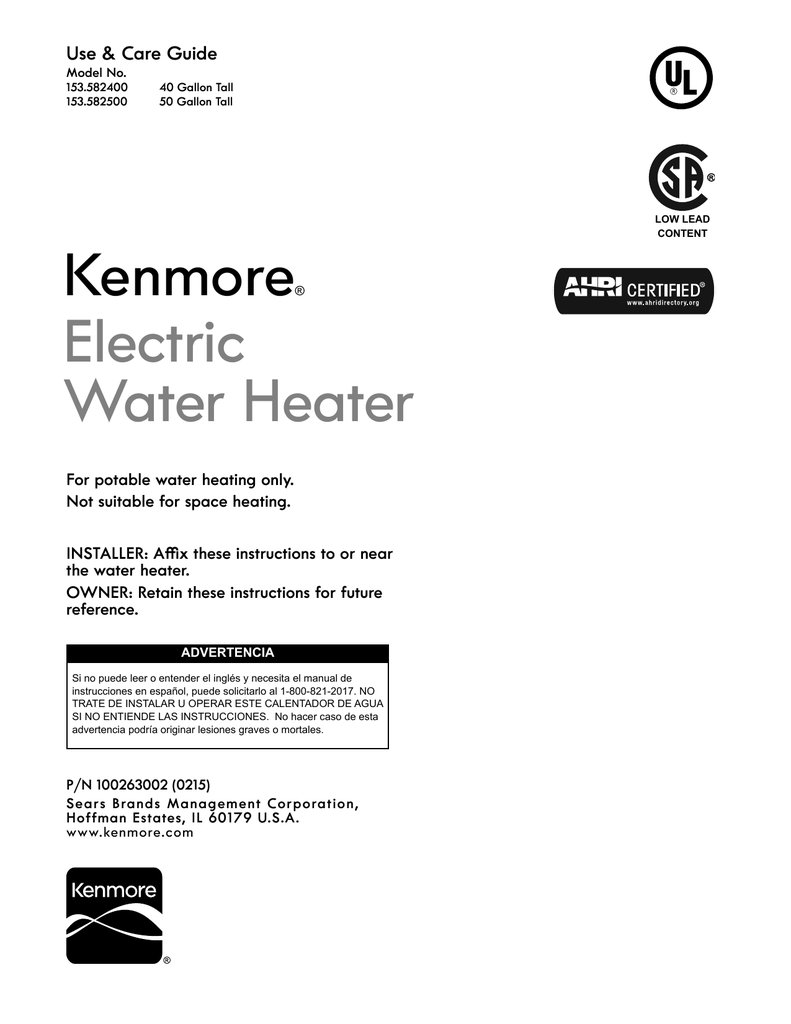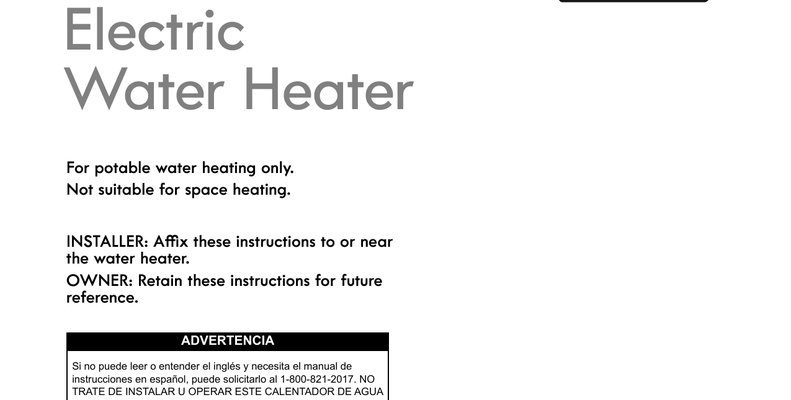
This question pops up more than you might think—especially for anyone who’s ever moved into a new home, inherited a property, or even bought a used appliance. Warranties can feel mysterious, with their fine print and sometimes cryptic rules. But don’t worry. Let’s break down exactly what happens with Kenmore water heater warranties when ownership changes hands, so you’ll know exactly where you stand.
How Kenmore Water Heater Warranties Usually Work
Let me explain what typically happens with Kenmore water heater warranties, because this sets the stage for understanding transfers. Kenmore, as a brand, has been around for ages—think of it like that friend who’s always there with dependable advice. Their water heaters come with warranties that cover things like defects in materials or workmanship. It’s Kenmore’s way of saying, “We stand by our product, and if something goes wrong that’s our fault, we’ll make it right.”
Most Kenmore water heaters come with a factory warranty that lasts anywhere from 6 to 12 years, depending on the model and whether you’ve registered the product or just plopped it in your basement and forgotten about it. The coverage can include the tank, parts, and sometimes even labor, but these details vary.
Here’s the thing: The warranty is designed to protect the original buyer—the person who first installed the heater and registered the details with Kenmore or the retailer. If the unit ever needs a reset, troubleshooting, or parts replaced due to manufacturer fault, the warranty kicks in. But who exactly counts as “the owner” after a sale or a move? That’s where things get a little fuzzy—and where transferability becomes super important.
Is the Warranty on a Kenmore Water Heater Transferable?
Now for the big question: Can you transfer the warranty on a Kenmore water heater to a new owner? Honestly, most people assume the warranty tags along with the appliance, like an old sticker on a suitcase. But with Kenmore water heaters, the answer usually comes down to the fine print.
The majority of Kenmore water heater warranties are *not* transferable. That means, once the home or water heater changes hands, the warranty typically ends, even if there’s still time left on the clock. This rule is buried in the warranty document, but it’s there—and it often catches people off guard. Kenmore’s warranty is tied to the original purchaser, and it’s usually null and void after a property transfer.
There are rare cases where a builder-grade installation or some new-construction scenarios may offer a transferable warranty, but those are the outliers, not the rule. If you’re buying a house and hoping the water heater’s warranty will sync over to your name, you’ll want to ask for the original paperwork, check the serial number, and dive into the warranty terms. Don’t count on it just sticking around by default.
Why Are Warranties Usually Non-Transferable?
You might be wondering, “Why can’t I just take over the warranty? The heater hasn’t moved!” It does seem a little unfair, right? But manufacturers, including Kenmore, draw a pretty hard line for a reason.
Warranties are a kind of contract—between the company and the first owner. It’s Kenmore’s way to stand behind their work, but only if they know the water heater’s full history: how it was installed, if it’s been paired up with off-brand parts, whether it’s seen any major repairs, or even if the battery backup (if it has one) has ever been swapped out. Once that heater switches hands, Kenmore can’t be sure the new owner has followed all the rules.
Honestly, think of it like buying a used car with no service records. The manufacturer just can’t vouch for what’s happened since it left the showroom floor. They’re concerned about possible code violations from DIY installs, missed maintenance, or tinkering that could mess up how the heater works. Making warranties non-transferable keeps things simple for Kenmore and avoids a lot of sticky troubleshooting headaches down the line.
What If I Buy a Used Kenmore Water Heater?
Let’s talk real-world scenarios. Maybe you spot a used Kenmore water heater for sale, and it looks almost brand new. The seller promises it’s under warranty, but you’re right to be cautious.
The truth: Even if the warranty time isn’t up, most Kenmore warranties end with the first owner. If you buy a used unit and run into a problem—like the tank leaks, the heating element goes bad, or there’s some weird code flashing on a digital display—you’ll be responsible for all repairs or replacements, no matter what. Kenmore’s service team will usually ask for proof of your original purchase, not just the serial number.
If you’re set on buying used, here are some smart steps:
- Ask for original paperwork to see the warranty terms yourself.
- Check if there’s any special transfer process (spoiler: usually, there isn’t).
- Budget for repairs, since you’ll probably be out of warranty.
- Test and inspect the heater before you buy—don’t assume a safety net.
In short, a Kenmore heater’s warranty almost never tags along to a secondhand owner.
How to Check Your Kenmore Water Heater Warranty Status
Not sure if your Kenmore water heater’s warranty is still good—even as the original owner? Here’s how you can check without getting lost in the weeds.
First, you’ll need the model number and serial number from the unit itself. Usually, these numbers are printed on a sticker on the tank. If you’re lucky, you’ll also have the original purchase receipt tucked away somewhere, which makes life much easier.
Once you’ve got the info, you can:
- Call Kenmore’s customer service hotline to confirm coverage dates and status.
- Look online—some warranty checkers on retailer or manufacturer sites let you enter your serial number for instant status.
- Review your original warranty paperwork for all the fine print about transfer rules, resets, and what’s actually covered.
Remember: If your name doesn’t match the original registration, Kenmore may not honor the warranty. They might also ask for installation details, especially with older heaters where code compliance changes over time.
What About Home Warranty Plans and Third-Party Coverage?
Luckily, not all hope is lost if you move into a home with a Kenmore water heater but no transferable warranty. This is where home warranty plans come into play. These are separate maintenance or repair policies you can buy that cover major appliances, regardless of the original factory warranty.
Here’s the thing: Home warranty companies are like a universal remote for repairs—they’ll cover a range of appliances from various brands, including Kenmore. If your water heater acts up, you call them, not Kenmore. They’ll send a contractor to troubleshoot, reset, or even replace the unit for a set service fee.
But, these plans have their own rules and limits. Coverage depends on your agreement, and some things (like pre-existing problems or certain parts) might not be included. Always read the fine print before you sign up, and don’t assume your plan will cover every code or system on your Kenmore heater.
Alternatives and Workarounds for Expired or Non-Transferable Warranties
So, say you’re out of luck with the Kenmore warranty—what now? Don’t panic. There are a few creative options to keep your water heater in good shape, even without the safety net of factory coverage.
- DIY Troubleshooting: Many basic issues, like a pilot light reset or anode rod cleaning, are totally fixable with some patience and an online guide. Kenmore water heaters are built to be serviceable—if you’re comfortable, give it a shot.
- Hire a Licensed Plumber: If you hit a wall, a pro can quickly spot issues, swap bad parts, or handle code problems. Yes, it costs more up front, but it’s a lot safer than improvising (especially with gas models).
- Buy Replacement Parts: Even without a warranty, you can get authentic Kenmore parts online or at major retailers. Upgrading things like thermostats, heating elements, or even smart controllers can add years to your heater’s life.
- Consider Upgrading: Sometimes, if repairs are piling up, it’s worth weighing the cost of a new unit with a fresh warranty, versus throwing money at old problems.
At the end of the day, you don’t have to feel stuck just because the warranty doesn’t transfer. There’s almost always a way forward if you know what to expect.
How Kenmore Compares to Other Brands on Warranty Transfers
If you’re comparing brands or thinking about replacing your water heater, it’s worth knowing how Kenmore stacks up. Most mainstream brands—like Rheem, AO Smith, or Bradford White—have similar policies: warranties stick with the original owner and end when the appliance gets a new home.
Some premium or niche brands may offer limited transferability, often for a fee or within a certain timeframe. For example, certain tankless water heater brands allow transfers if you complete a registration process within 30–60 days of purchase. But for traditional tank-style heaters like Kenmore’s, the “no transfers allowed” rule is pretty standard.
So, if you move or buy a used unit from any popular brand, you’re likely to face the same non-transfer policy. The moral of the story: If a transferable warranty is essential for you, ask up front, read the paperwork, and consider alternatives like home warranty coverage.
Final Thoughts: Navigating Kenmore Water Heater Warranties When You Move or Buy Used
Warranties can be confusing, especially when you’re juggling a home move, a new-to-you basement full of mystery appliances, or just trying to stretch your budget. With Kenmore water heaters, the bottom line is clear: the original factory warranty usually *can’t* be transferred to a new owner. It sticks with the person who bought and registered the unit first.
But don’t stress. Knowing the rules ahead of time helps you plan smarter—whether that means getting a home warranty plan, budgeting for repairs, or simply being proactive about regular maintenance. And hey, if you ever need help decoding warranty language or troubleshooting a Kenmore water heater, there’s no shortage of resources online or from the local pros.
In the end, appliances (like so much else in homeownership) are about working with what you’ve got, asking the right questions, and not being afraid to dig into the details. Stay curious, stay prepared, and your water will stay hot—warranty or no warranty.
